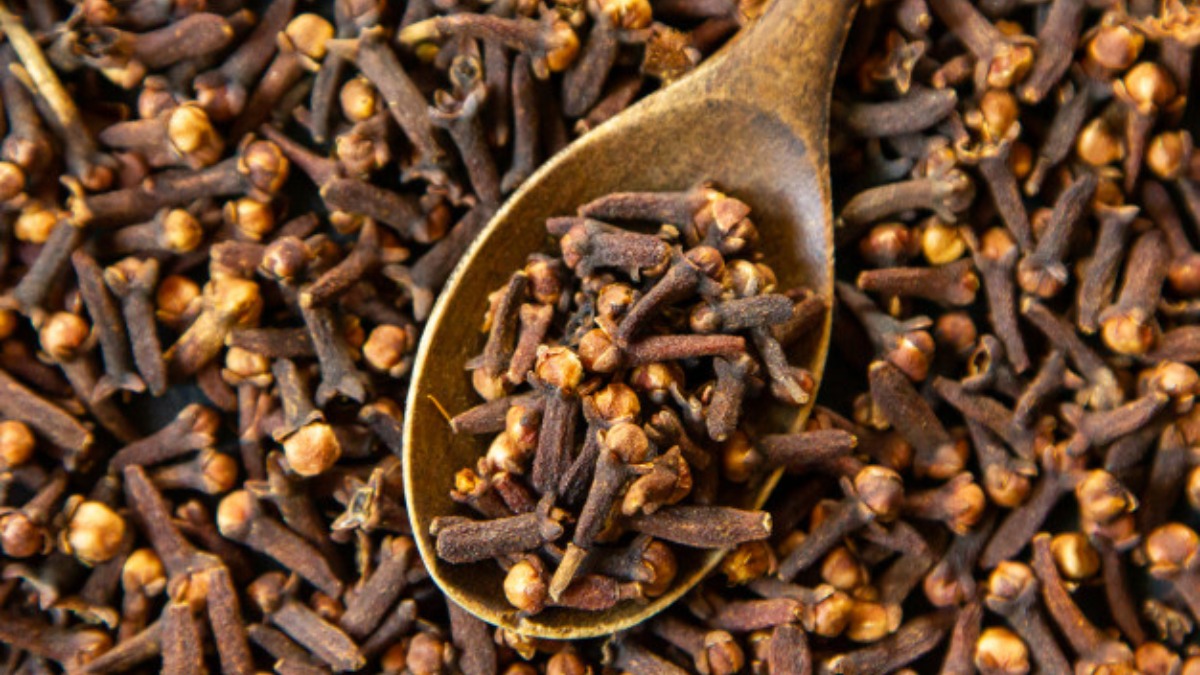Health
Controls diabetes, promotes bone health… see 6 health benefits of cloves

Cloves are small, dark brown, and aromatic flower buds of a tree in the family Myrtaceaetree, Syzygium aromaticum which originate from Indonesia. They can, however, be found in several parts of the world.
Available in both whole and ground form, cloves are renowned for their sweet and aromatic touch, elevating the flavor of dishes. Aside from its culinary benefits, cloves have been proven to also have several health benefits.
Here are some health benefits you would get from cloves when used.
High in antioxidants
Cloves are a rich source of antioxidants. Antioxidants are compounds that reduce oxidative stress, which can contribute to the development of chronic disease.
Cloves also contain a compound called eugenol, which has been shown to act as a natural antioxidant.
It was found that eugenol stopped oxidative damage caused by free radicals five times more effectively than other antioxidants.
Including cloves in your diet along with other antioxidant-rich foods can help improve your overall health.
Promotes bone health
Cloves contain minerals like manganese which play a role in bone health.
Manganese is a mineral that is involved in the formation of bone and is incredibly important to bone health. Adequate intake of it also helps prevent osteoporosis.
Meanwhile, one teaspoon of ground clove provides 55% manganese. So taking cloves can increase your bone mineral density and bone growth.
A study also found that clove extract high in eugenol improved several markers of osteoporosis and increased bone density and strength.
Keeps diabetes in control
Cloves also serve as an anti-diabetic agent. The compounds found in cloves, particularly eugenol, can help protect against cancer.
Several studies and tests have proven that cloves may reduce cancer cell growth and promote cancer cell death.
A test-tube research found that eugenol promoted cell death in cervical cancer cells.
Another study found that clove extract helped stop the growth of tumors and promoted cell death in cancer cells.
Helps with weight management
The compounds in cloves may help improve metabolism and control body weight.
In a study of mice, researchers found that clove extract reduced the incidence of obesity resulting from a high-fat diet.
Mice who received the clove extract had lower body weight, less abdominal fat, and less liver fat than those in the control group.
Adding cloves to your diet could support weight management efforts.
Improves oral health
Cloves, particularly its oil, can serve as a natural method for maintaining oral health due to their effect on plaque, gingivitis, and bacteria in the mouth.
Researchers have compared the effectiveness of an herbal mouth rinse containing cloves, basil, and tea tree oil with a commercially available essential oil mouth rinse.
Both mouth rinses were effective against plaque and gingivitis, showing that they may help decrease oral inflammation and bacteria.
However, it was found that the mouth rinse that contained cloves decreased the number of harmful bacteria more than the commercial mouth rinse.
Also, after using the herbal mouthwash for 21 days, the participants showed improvements in gum health, as well as the amount of plaque in the mouth.
Anti-inflammatory properties
Cloves contain eugenol, a natural compound with strong anti-inflammatory effects.
This can help reduce inflammation in the body, making cloves potentially beneficial for individuals with inflammatory conditions such as arthritis and asthma.
Cloves also have antimicrobial properties, meaning they can help stop the growth of microorganisms like bacteria.
A study showed that clove essential oil killed three common types of bacteria, including E. coli, which is a strain of bacteria that can cause food poisoning.
To easily incorporate cloves into your dishes, you can get the ground form.
You can also simmer whole cloves in boiling water for 5–10 minutes to make a soothing cup of clove tea.
However, it is important to consume in moderation.
Health
5 symptoms and causes of infertility in men

Trying to conceive a child can be an exciting time, filled with hope and anticipation. But for some couples, it can also be a frustrating journey.
If you’ve been trying to get pregnant for a year without success, you and your partner might be facing infertility.
Infertility is a common condition affecting about 1 in 7 couples and it can affect both men and women. We’ll be focusing on male infertility, what to look out for, and the reasons behind it.
Let’s clear something up first: there often aren’t any obvious signs of male infertility. The main indicator is simply the inability to conceive a child after a year of trying. However, there can be some underlying issues that might cause problems. By understanding these, you can have a more open conversation with your doctor and explore potential solutions.
5 Signs that might point toward male infertility
1. Sexual difficulties
This can include problems ejaculating, low semen volume, erectile dysfunction (trouble getting or keeping an erection), or reduced sex drive. These issues can sometimes be symptoms of hormonal imbalances or other conditions affecting fertility.
2. Testicular issues
Pain, swelling, or a lump in the testicle area can be a red flag.
Healthy sperm production relies on the proper functioning of the testicles, so any abnormalities there might need to be checked by a doctor.
3. Past medical history
Certain medical conditions like undescended testicles (when the testicles don’t move down into the scrotum before birth), infections (including sexually transmitted infections), or surgeries like vasectomy (a procedure for permanent birth control) can impact sperm production or delivery.
4. Lifestyle choices
Habits like smoking, heavy alcohol use, and recreational drugs can all affect sperm quality and count.
Health
Why you’re not losing weight even though you work out

Working out is usually seen as the go-to solution for weight loss. You put in the effort, sweat through the workouts, and expect the scale to show your hard-earned results.
However, many find themselves frustrated when the weight doesn’t come off as expected. This common issue can be disheartening, but understanding why you’re not losing weight despite exercising can empower you to make the necessary adjustments and continue your fitness journey with confidence.
Let’s explore the key reasons why your workout might not be reflecting on the scale.
1. Gaining muscle mass
One of the most positive reasons for not seeing a drop in weight is muscle gain. Muscle is denser than fat and takes up less space in your body. Therefore, as you lose fat and gain muscle, your overall weight might not change, but your body composition is improving. You might notice your clothes fitting better or see more muscle definition.
2. Not drinking enough water
Hydration is crucial for weight loss. Water helps suppress appetite, boosts metabolism, and aids in digestion. When you’re dehydrated, your body might retain water, making you feel heavier. Aim to drink at least half your body weight in ounces of water daily, especially if you’re increasing your fibre intake.
3. Eating more than you burn
Exercise can increase your appetite, and without mindful eating, you might consume more calories than you burn. Even healthy foods can contribute to weight gain if eaten in large quantities. Tracking your calorie intake can help ensure you’re in a calorie deficit, which is necessary for weight loss.
4. Not enough non-exercise activity
Non-exercise activity thermogenesis (NEAT) plays a significant role in weight management. NEAT includes all the movements you do outside of structured exercises, such as walking, cleaning, and fidgeting. If your workouts leave you too exhausted to move much for the rest of the day, your overall calorie burn might decrease. Incorporating more daily movement can boost your NEAT and aid in weight loss.
5. Lack of sleep
Sleep is essential for regulating hormones that control hunger and metabolism. Inadequate sleep can increase levels of ghrelin, the hunger hormone, and decrease levels of leptin, the hormone that makes you feel full. This imbalance can lead to increased appetite and weight gain. Aim for seven to nine hours of sleep per night to support your weight loss efforts.
6. Stress and hormonal imbalances
Chronic stress can lead to elevated levels of cortisol, a hormone that promotes fat storage, particularly around the abdomen. Additionally, certain medical conditions and medications can affect your weight. If you suspect stress or a health issue is hindering your progress, consider consulting a healthcare professional for guidance.
Health
What to eat and avoid when treating malaria

Malaria is a serious disease that affects millions of people around the world. It is caused by parasites transmitted to humans through the bites of infected mosquitoes.
When someone gets malaria, they often feel very sick with symptoms like high fever, chills, headache, and muscle pain. If not treated promptly, malaria can become life-threatening.
However, with proper medical care and attention to diet, patients can recover.
Understanding malaria and its transmission
Malaria is transmitted through the bite of a female Anopheles mosquito infected with Plasmodium parasites.
When this mosquito bites a person, the parasites enter the bloodstream and travel to the liver, where they multiply. After leaving the liver, they infect red blood cells, causing the symptoms of malaria.
Treating malaria
The primary treatment for malaria is antimalarial medication prescribed by a doctor. The type of medication and length of treatment depend on the type of malaria parasite and the severity of the disease. Early diagnosis and treatment prevent complications.
Patients should follow their doctor’s instructions carefully and complete the full course of medication even if they start feeling better.
Foods to eat when treating malaria
Proper nutrition plays a vital role in the recovery from malaria. Here are some foods that can help:
- Fruits and vegetables: Fresh fruits and vegetables are rich in vitamins and minerals that boost the immune system. Oranges, apples, carrots, and leafy greens are excellent choices.
- High-protein foods: Protein is essential for healing and rebuilding body tissues. Include lean meats, fish, eggs, beans, and nuts in your diet.
- Whole grains: Whole grains like brown rice, oats, and whole wheat bread provide necessary energy and fibre, aiding digestion and overall health.
- Hydration: Drinking plenty of fluids is crucial. Water, fresh fruit juices, and coconut water help keep the body hydrated and flush out toxins.
- Soups and broths: Light soups and broths are easy to digest and can be nutritious. Chicken soup, in particular, is beneficial.
Foods to avoid when treating malaria
Certain foods can hinder recovery from malaria and should be avoided:
- Fatty and fried foods: These can be difficult to digest and may cause nausea or discomfort. Avoid fried snacks, heavy sauces, and greasy meals.
- Processed foods: Processed and packaged foods often contain unhealthy fats, sugars, and preservatives that can weaken the immune system.
- Caffeinated drinks: Coffee, tea, and other caffeinated beverages can lead to dehydration, which is not ideal when dealing with malaria.
- Alcohol: Alcohol can interfere with the effectiveness of antimalarial drugs and can also dehydrate the body.
- Spicy foods: Spicy foods can irritate the stomach and should be avoided, especially if the patient is experiencing nausea or vomiting.
Malaria is a serious disease that requires prompt medical treatment and proper care. Along with taking prescribed medication, eating the right foods can significantly aid in recovery.
-

 Health7 days ago
Health7 days agoWhat to eat and avoid when treating malaria
-

 World1 week ago
World1 week agoComputer scientist claiming invention of Bitcoin faces criminal investigation in UK
-

 Politics1 week ago
Politics1 week agoSenator Monguno replaces Ndume as Senate Chief Whip
-

 Celebrities1 week ago
Celebrities1 week agoMohbad’s wife claims Joseph Aloba is her son’s greatest enemy
-

 Politics1 week ago
Politics1 week agoAppeal court affirms Douye Diri as Bayelsa governor
-

 Politics1 week ago
Politics1 week agoActress Hilda Dokubo suspended as Labour Party’s Rivers chairperson
-

 Entertainment1 week ago
Entertainment1 week agoRema’s ‘HEIS’ sets record for biggest opening week on Spotify Nigeria in 2024
-

 Politics1 week ago
Politics1 week agoOndo LP Governorship candidate, Dr Ayodele Olorunfemi promises ₦120k minimum wage if elected


















